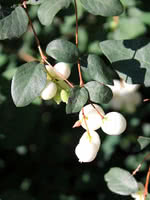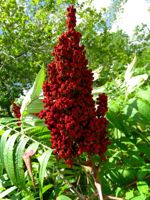Mon-Fri 9am - 5pm Mountain time
Western Snowberry vs Smooth Sumac
Symphoricarpos occidentalis
Rhus glabra
NOT AVAILABLE THIS SEASON - MIGHT RETURN
NOT AVAILABLE THIS SEASON - MIGHT RETURN
Like the Common Snowberry, the Western Snowberry is a small shrub with pink flowers useful for feeding livestock and preventing erosion. Unlike the common species, however, the Western Snowberry is much more suited to wet conditions, capable of persevering through poor soil drainage and occasional flooding.
After the Snowberry's flowers have bloomed, it produces berries which often last on the plant through winter. These berries are toxic to humans, but livestock and local wildlife love them! Those hoping to attract wildlife to their property can plant Snowberry and expect to see animals foraging on it much later in the year than other plants.
Smooth Sumac is an excellent shrub for both its ornamental appeal and tolerance of difficult planting sites. You'll love the attractive pyramidal spikes of hairy, red berries that emerge on female plants and the fern-like foliage that covers both male and female varieties.
Ensure you give Smooth Sumac enough space to spread out due to its high suckering nature. While not ideal for small, urban yards, this shrub will make a stunning border along a woodland edge or roadside.
Note:These plants typically reach maturity and make their sex easily known (females producing fruit) in their 3rd or 4th year of growth. Our seedlings are too young to identify their sex.
Western Snowberry Quick Facts
Smooth Sumac Quick Facts
Toxicity: berries are toxic to humans

